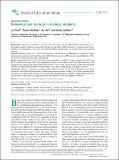Behaviour and burnout in medical students
Abstract
Background: Burnout is prevalent in doctors and can impact on job dissatisfaction and patient care. In medical students, burnout is associated with poorer self-rated health; however, it is unclear what factors influence its development. This study investigated whether health behaviours predict burnout in medical students. Methods: Medical students (n=356) at the Universities of St Andrews and Manchester completed an online questionnaire assessing: emotional exhaustion (EE), depersonalisation (DP), personal accomplishment (PA), alcohol use, physical activity, diet, and smoking. Results: Approximately 55% (54.8%) of students reported high levels of EE, 34% reported high levels of DP, and 46.6% reported low levels of PA. Linear regression analysis revealed that year of study, physical activity, and smoking status significantly predicted EE whilst gender, year of study, and institution significantly predicted DP. PA was significantly predicted by alcohol binge score, year of study, gender, and physical activity. Conclusions: Burnout is present in undergraduate medical students in the United Kingdom, and health behaviours, particularly physical activity, predict components of burnout. Gender, year of study, and institution also appear to influence the prevalence of burnout. Encouraging medical students to make healthier lifestyle choices early in their medical training may reduce the likelihood of the development of burnout.
Citation
Cecil , J E , McHale , C T , Hart , J & Laidlaw , A H 2014 , ' Behaviour and burnout in medical students ' , Medical Education Online , vol. 19 , 25209 . https://doi.org/10.3402/meo.v19.25209
Publication
Medical Education Online
Status
Peer reviewed
Type
Journal article
Description
Date of Acceptance: 28/07/2014Collections
Items in the St Andrews Research Repository are protected by copyright, with all rights reserved, unless otherwise indicated.

